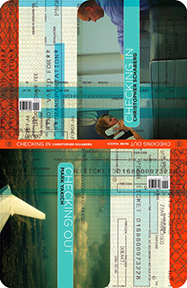The Lufthansa flight from Milan, bound ultimately for New York, was crowded and uncomfortable. I needed to switch planes in Frankfurt, which elicited no great reaction on my part. While I preferred direct flights, the occasional transfer had always gone smoothly.
I would have but an hour at the Frankfurt airport, time enough to quickly eat, get coffee, procure reading material (of the old-school, paper variety). It would be interesting—visual logistics permitting—to get at least some look at the city of Frankfurt.
This flight would be late, we learned, in arriving at Frankfurt. Another announcement came soon after: Passengers transferring to New York—me—needed to be aware that the gate assignment had changed.
When I finally disembarked, I suddenly ascertained that I had a real situation on my hands. Our flight was really very late and the New York connection was on the opposite end of the airport. One other man had deplaned with me—also New York-bound—and he was equally alarmed. Instinctively, we both began running.
It had never occurred to me that running through an airport with a suitcase in hand renders one foolish-looking. Logically, this makes no sense: People rush through airports all the time. But my visceral feeling was of embarrassment. Running in tandem with this stranger only increased the embarrassment. My running partner, though, soon dropped out. “Tell them to wait for me,” he yelled in a voice that seemed to carry throughout the entire airport. “Tell them I’m coming.”
The airport passed by me in a blur. There was a very real chance I was going to miss my plane. I clambered onto a moving walkway, grateful to shave off perhaps a full minute. Ahead of me, an older couple fumbled as they neared the end of this moving belt. To my horror, the man actually fell, and then the woman fell on top of him; a jumble of bodies and luggage.
Before I had a chance to absorb this, I realized I was soon going to topple into them. This was very serious indeed. I began sprinting backwards. The couple still had not extricated themselves. I sprinted backwards a second time, then a third. Finally, the couple rose and got out of the way.
After ascertaining that they were okay—miraculously, neither had been injured—I resumed my mad sprint to the gate. The attendant seemed mildly disgusted. “What went wrong with your flight?” he asked, the tone accusatory, as if somehow I had shared in the responsibility. I then duly informed him of my running companion, who was certainly wheezing his own eventual way to the gate.
I tottered onto the plane, covered in sweat. The eyes of the passengers were on me, the late arrival. Then a familiar voice boomed out: “We made it, buddy! We made it!” I again felt embarrassed to be associated with this person, a self-consciousness that one probably should outgrow after high school.
It was the most uncomfortable, crowded flight of my life: jammed in the middle seat, sans reading material. The airplane was stiflingly hot. I watched Goodfellas—which seems to have become an entertainment staple on air travel—for perhaps the fourth time.
This flight did not feature a meal. The sustenance I was supposed to obtain at the airport had not, of course, materialized. I made do with the little baggies of candied almonds, cookies. Goodfellas’ famous scenes played out on my little screen: The “Funny, how?” incident, Tommy getting whacked, Paulie turning his back on Henry.
When I arrived at JFK, hours and hours later, it took around another good hour to ascertain that the rest of my luggage—which I’d checked—was missing. My odyssey had only just begun. Securing my luggage involved a month’s worth of misdirected phone calls, unanswered messages, lack of human or answering machine, emails, formal complaints. Eventually, my hardy, well-traveled suitcase was finally returned to me.
All in all, this was a singular experience: a fusion of Teutonic hospitality and Italian efficiency. It seemed slightly akin to other experiences I’ve had my life: tooth extraction, food poisoning.
Of course, these things—and worse—are a standard part of air travel. Everyone has heard the horror stories.
But I don’t really care.
Richard Klin is the author of the novel Petroleum Transfer Engineer (Underground Voices). His work has appeared in The Atlantic, The Brooklyn Rail, The Millions, The Forward, CounterPunch, Cultural Daily, and many others.






